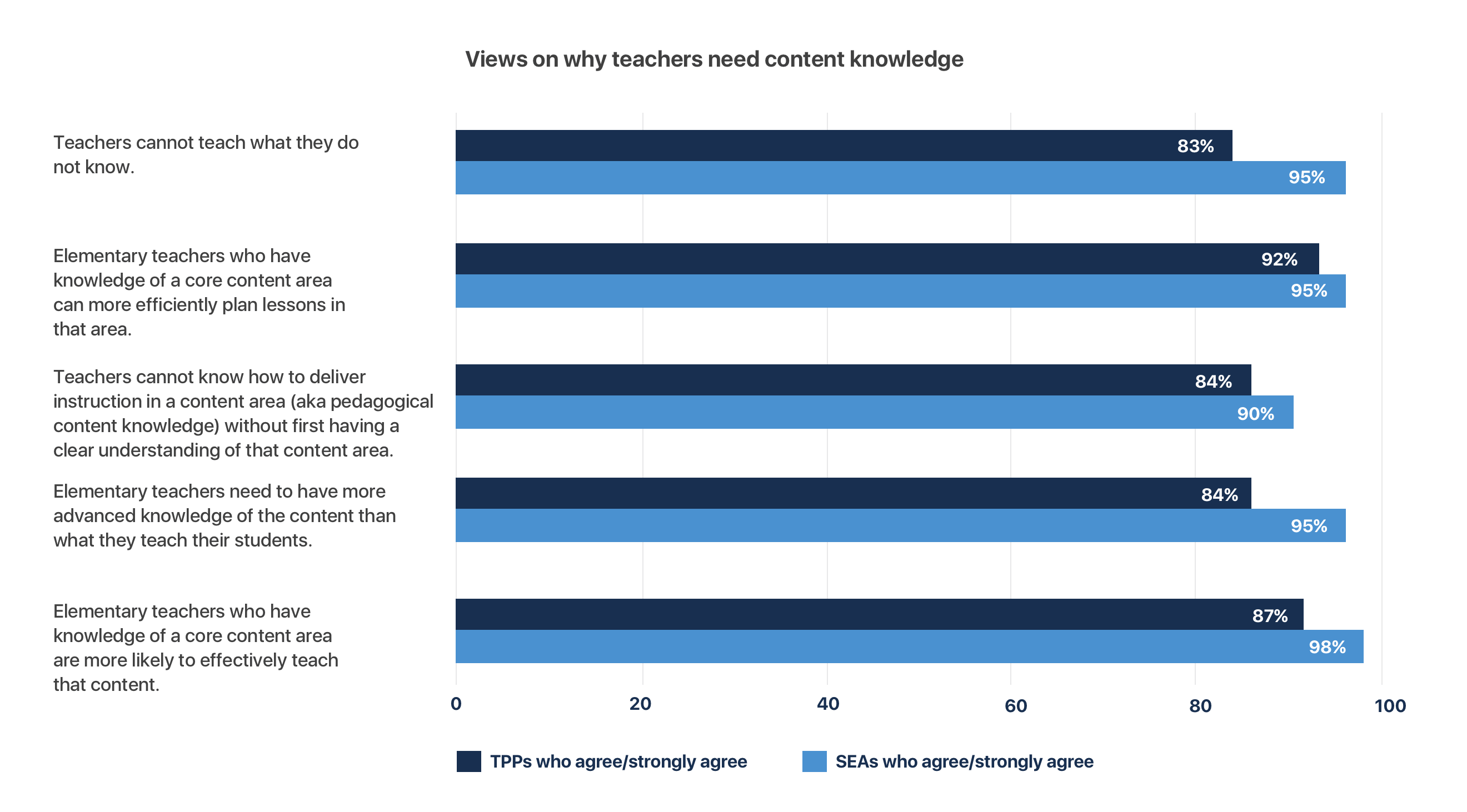Elementary teachers need to know the content they will teach. Surveys of teachers report that 98% believe that teachers should be expected to demonstrate content knowledge before they begin teaching.194 A 2020 NCTQ survey of leaders from state education agencies and teacher preparation programs back them up, finding that 84% of leaders from prep programs and 95% of leaders from state education agencies agree that teachers should demonstrate this knowledge before having their own classroom.

NCTQ’s survey further illustrated broad agreement across the field for the many reasons that teachers’ knowledge of core subjects (English language arts, math, science, and social studies195) is essential. (For more on the findings of this NCTQ survey, visit the FAQs for this project.)
(Click image to expand.)
In spite of this consensus, the sad fact is that many teachers reach the classroom without a firm grasp of the content they will be expected to teach. In a survey on behalf of the National Science Foundation, elementary teachers report feeling very well-prepared to teach reading/ELA, but not most mathematics subtopics, science, or social studies, and their reported rates of preparedness have declined in all subjects between 2012 and 2018.196
But why does knowledge in the four core content areas matter at all? Building elementary students’ knowledge across a range of subjects is important for several reasons.
A broad base of content knowledge supports reading comprehension. Much as learning phonics helps students decipher the sound of words, learning about a breadth of subject areas helps students draw meaning from what they read. A review of decades of research confirms that,
“higher levels of background knowledge enable children to better comprehend a text. Readers who have a strong knowledge of a particular topic, both in terms of quantity and quality of knowledge, are more able to comprehend a text than a similarly cohesive text for which they lack background knowledge.”1
Tests of students’ reading comprehension reveal that their knowledge of the topic (in these studies, baseball or soccer) predict their comprehension more accurately than their reading ability does.2 Moreover, spending more class time on social studies is associated with improved reading ability, especially for students who are learning English and those from low-income backgrounds.3
Disparities in coursework that emphasize a breadth of content is another source of inequity for students of color and students from low-income backgrounds. Learning core content builds the foundation for later grades and supports students’ ability to enter postsecondary education. In a recent report on educational equity, the National Academies of Sciences identified “disparities in curricular breadth,” in particular “availability and enrollment in coursework in the arts, social sciences, sciences, and technology” as a key indicator of educational inequities.4 Data from NAEP and other sources confirms a sizable opportunity gap in core content areas for students of color and students from low-income backgrounds.5

Building teachers’ content knowledge is essential, but the education system is currently falling short. To this end, NCTQ is undertaking a new initiative to draw attention to the importance of elementary teachers’ content knowledge, and to leverage a powerful tool that can not only confirm that new teachers know core content, but that can also shine a light on systemic inequities in education and drive improvements in how future teachers are prepared. In the coming months, we will explore data from the most common tool used to assess teachers’ content knowledge, licensure tests. This work will illustrate how information about the proportion of test takers who pass these tests can help identify strengths and missed opportunities in current preparation for aspiring teachers, and how the field can use this data to build a stronger, more diverse teacher workforce.
Stay tuned for NCTQ’s landmark release of elementary content licensure test pass rate data, coming July 2021.
Learn more about this project and explore frequently asked questions at www.nctq.org/review/passrates.
More like this

Teacher licensure pass rate data: Lessons learned on teacher quality and diversity
Information gleaned from licensure tests can offer a compass, guiding efforts to strengthen and diversify the teacher workforce.

The opportunity to learn from teacher licensure pass rate data — and why it matters
Strengthening our teacher workforce begins with better, more transparent data.
Endnotes
- Smith, R., Snow, P., Serry, T., & Hammond, L. (2021). The role of background knowledge in reading comprehension: A critical review. Reading Psychology, 42(2), 1-27.
- Recht, D. R., & Leslie, L. (1988). Effect of prior knowledge on good and poor readers’ memory of text. Journal of Educational Psychology, 80(1), 16; Schneider, W., Körkel, J., & Weinert, F. E. (1989). Domain-specific knowledge and memory performance: A comparison of high- and low-aptitude children. Journal of Educational Psychology, 81(3), 306.
- Tyner, A. & Kabourek, S. (2020) Social Studies Instruction and Reading Comprehension: Evidence
from the Early Childhood Longitudinal Study. Washington D.C.: Thomas B. Fordham Institute. Retrieved from https://fordhaminstitute.org/national/resources/social-studies-instruction-andreading-comprehension.
- National Academies of Sciences, Engineering, and Medicine (2019). Monitoring Educational Equity. Washington, D.C.: The National Academies Press. https://doi.org/10.17226/25389. Retrieved from https://www.nap.edu/catalog/25389/monitoring-educational-equity.
- For example, 2015 science assessment data finds that 51% of white students were proficient or advanced, compared with 15% of Black students and 21% of Hispanic students. This same year, 55% of students who were not eligible for the National School Lunch Program (NSLP) scored proficient or advanced, compared with only 22% who were eligible for the NSLP. National Center for Education Statistics. (2015). National Assessment of Educational Progress: 2015 Science Assessment. Washington, D.C.: National Center for Education Statistics, Institute of Education Sciences, U.S. Dept. of Education. Retrieved from https://www.nationsreportcard.gov/science_2015/#acl?grade=4.



